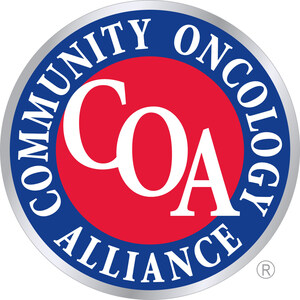COA Oncology Medical Home Committee Approves 16 Measures To Evaluate And Reward Quality, Cost Efficiency And Outcomes
Implementation of Model to Benefit Patients, Providers and Payers
WASHINGTON, July 18, 2012 /PRNewswire/ -- The Community Oncology Alliance (COA), a non-profit organization dedicated to preserving and fostering community cancer care, announced that the Oncology Medical Home (OMH) Steering Committee has reached a significant benchmark in the development of the OMH model for cancer care. A list of sixteen quality, value and outcome measures has been approved as a result of the coordinated work by a cross-section of 18 cancer care stakeholders representing patients, cancer care advocacy organizations, payers, physicians, cancer care management and care-givers.
This list of measures is part of an on-going process to recognize and reward quality, value, and positive outcomes in cancer care. Agreement and acceptance amongst the stakeholder groups is critical for developing measures by which all participants in the cancer care system can be evaluated. This initial list covers adherence to National Comprehensive Cancer Network (NCCN) guidelines; minimizing emergency room visits and inpatient admissions; screening and interventions for psycho/social needs; utilization of hospice services; patient satisfaction; and other value, quality and outcome measures.
"The comprehensive care provided by an oncology medical home delivers a higher quality patient experience at a better value," said Dr. Bruce Gould, Steering Committee Chair, Medical Director of Northwest Georgia Oncology Centers, and COA board member. "With the measures determined, our next goal will be to develop and promote payment models that reward and promote quality, value and superior outcomes while minimizing administrative and financial burdens."
"In most cases the oncologist becomes a patient's care coordinator during cancer treatment and follow-up care. This continuity of care helps optimize outcomes and prevention of adverse events. COA's oncology medical home project is unique because it recognizes that," says Carol Murtaugh, RN OCN, Chairperson of the OMH Implementation Committee and an oncology practice administrator. "One of the key components of an OMH is measuring patient satisfaction in a standard manner so that the care provided can be improved to achieve the highest levels of quality, satisfaction and value."
The oncology medical home model optimizes coordination of care and results in enhanced outcomes relating to the quality, efficiency, and cost of patient care. As a non-profit organization founded to support community oncology patients and providers, COA intends to offer a model that allows practices to become oncology medical homes. This will be accomplished by providing practices with an approach that allows them to move along a trajectory to becoming a medical home.
About Community Oncology Alliance (COA)
Formed in 2003 by community oncologists, COA is a non-profit organization dedicated solely to community oncology, where four out of five Americans with cancer are treated. COA has mobilized community oncology to become more politically active, and increased awareness on Capitol Hill about the community cancer care delivery system. Additionally, COA has brought together community oncology practices from across the country to share information in order to enhance the effectiveness and efficiency of the cancer care they provide to their patients. More information can be found at www.communityoncology.org.
SOURCE Community Oncology Alliance
WANT YOUR COMPANY'S NEWS FEATURED ON PRNEWSWIRE.COM?
Newsrooms &
Influencers
Digital Media
Outlets
Journalists
Opted In





Share this article